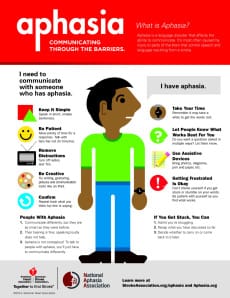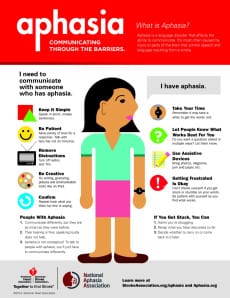
[ad_1]
June 18, 2014
Aphasia is a little-known language disorder that affects nearly one-third of stroke victims. It occurs when there is damage to the communications hub in the left side of the brain. While aphasia disrupts communication skills, it does not affect a person’s thinking skills.
There are many types of aphasia, but the most general categories are receptive and expressive aphasia. With receptive aphasia, the person can hear a voice or read print, but may not understand the meaning of the message. With expressive aphasia, the person knows what he or she wants to say yet has difficulty communicating it to others.
Someone with receptive aphasia may:
- Have difficulty comprehending what others say
- Have difficulty with reading comprehension
- Be unaware that they are using words incorrectly
Someone with expressive aphasia may:
- Be able to understand what others say
- Have difficulty saying what they are thinking
- Speak in a jumbled manner
- Say a word different than the one they want to say
- Have difficulty writing

While understanding the disorder is important, learning how to best communicate – either as someone with aphasia or as the loved one of someone with aphasia – is essential.
Does this apply to you or to a family member? First, determine how you or your loved one prefer to communicate. Do you want assistance with words or would you prefer to work on your own? If you say the wrong word or misunderstand what is spoken, do you want to be corrected? Once you establish how you or your loved one wish to communicate, the following tips may help along the way:
- Be patient
- Stay positive
- Speak slowly
- Remove distractions such as television or music
- Find a quiet, well-lit space
- Use printed cue cards or letters
- When in a group, speak one at a time
- Consider seeing a speech-language pathologist (SLP)
The American Stroke Association has developed an extensive list of tips for communicating after stroke.
June 18, 2014
[ad_2]
Source link
